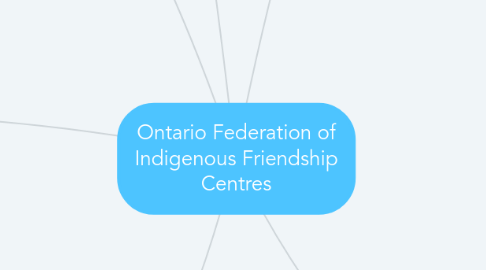Ontario Federation of Indigenous Friendship Centres
создатель Elle Murry

1. "The vision of the Friendship Centre movement is to “improve the quality of life for Indigenous people living in an urban environment by supporting self-determined activities which encourage equal access to and participation in Canadian society and which respect Indigenous cultural distinctiveness”."
2. Goals: Culture and Education, Leadership, Political Governance and Involvement, Self-Sufficiency, Program and Service Delivery
3. "Equity, Inclusion, and Awareness: Colonization, assimilation, and policies within the Indian Act have resulted in the unwilling loss of the rights, culture, language, and land of Indigenous people in Canada throughout the past five centuries. The detrimental effects of this historical trauma are visible at the community and individual levels, therefore, the OFIFC advocates that Indigenous children, youth, and adult learners learn in an education environment that is trauma-informed and culturally competent with respect to local Indigenous communities, and learn from curriculum that reflects the Indigenous history of Ontario. We work to advance these goals at the provincial level while providing Friendship Centres with resources to create a positive educational environment for Friendship Centre communities and schools that are free of racism."
4. Resources retrieved from:
4.1. http://www.ofifc.org/about-us/general-information/ofifc-overview
4.2. http://www.ofifc.org/policy/policy-positions/education
4.3. http://www.ofifc.org/accessibility
4.4. http://www.ofifc.org/about-friendship-centres/general/what-friendship-centres-do
5. Programs and Services
5.1. Children and Youth
5.1.1. Aboriginal Healthy Babies and Healthy Children
5.1.2. Urban Aboriginal Children's Program
5.1.3. Children's Mental Health Project
5.1.4. Children Who Witness Violence Program
5.1.5. Urban Aboriginal Youth Program
5.2. Education to Employment
5.2.1. Alternative Secondary School Program in Friendship Centres
5.2.2. Apatisiwin
5.3. Family
5.3.1. Homelessness Partnering Strategy
5.3.2. Urban Aboriginal Fetal Alcohol Spectrum Disorder Program
5.4. Healing
5.4.1. Healing and Wellness Program
5.4.2. Health Outreach Program
5.4.3. Kanawayhitowin
5.4.4. Kizhaay Anishinaabe Nin
5.5. Health
5.5.1. Aboriginal Diabetes Program
5.5.2. Addictions and Mental Health Programs
5.5.3. Life Long Care Programs
5.5.4. Urban Aboriginal Healthy Living Programs
5.6. Justice
5.6.1. Aboriginal Combined Courtwork Program
5.6.2. Aboriginal Criminal Courtwork Program
5.6.3. Aboriginal Community Justice Program
5.6.4. Aboriginal Family Courtwork Program
5.6.5. Gladue Writer
6. Access of Services
6.1. "The Friendship Centre Movement (FCM) is the country’s most significant off-reserve Indigenous service delivery infrastructure. Friendship Centres are not-for-profit and charity corporations that are mandated to serve the needs of urban Indigenous people by providing culturally appropriate services in urban communities. Friendship Centres are governed by a volunteer Board of Directors consisting of elected members. They are membership driven organizations in urban communities that serve all urban Indigenous people, regardless of status. Every Friendship Centre is managed independently from the OFIFC and offers supportive programs and services that are needed in their community, as well as providing a place of acceptance and well-being for Indigenous peoples. As every Friendship Centre is located in a different geographical location, the needs of each community differ as well. The dynamic staff and volunteers from each Friendship Centre provide up to as many as 20+ programs for urban Indigenous people, with services covering the full spectrum of the life cycle."
6.2. "The Accessibility for Ontarians with Disabilities Act (AODA) Under the Accessibility for Ontarians with Disabilities Act (AODA), accessibility standards regarding customer service, employment, transportation, information and communications have been developed to create a more accessible and barrier free Ontario. AODA standards require organizations to establish a culture of accessibility where persons with disabilities are provided goods and services in a manner that honours their dignity, independence and right to equal opportunity. OFIFC’s Accessibility Commitment OFIFC is dedicated to policies, practices, and procedures that align with AODA standards and will continue to make every reasonable effort to remove and prevent accessibility barriers. In compliance with the AODA, the OFIFC wishes to make available our customer service policy: A person’s disability will be taken into consideration when being communicated with. Service animals and support persons are welcome at OFIFC and within the facilities. Assisted devices are permitted for use by persons with disabilities. OFIFC employees are also available for assistance. Upon request, accessible formats or communication supports will be provided or arranged for persons with disabilities. Notifications pertaining to service disruptions will be place upon the OFIFC website as well as posted directly within the facilities. All OFIFC employees have receiv"ed training regarding AODA standards. "


